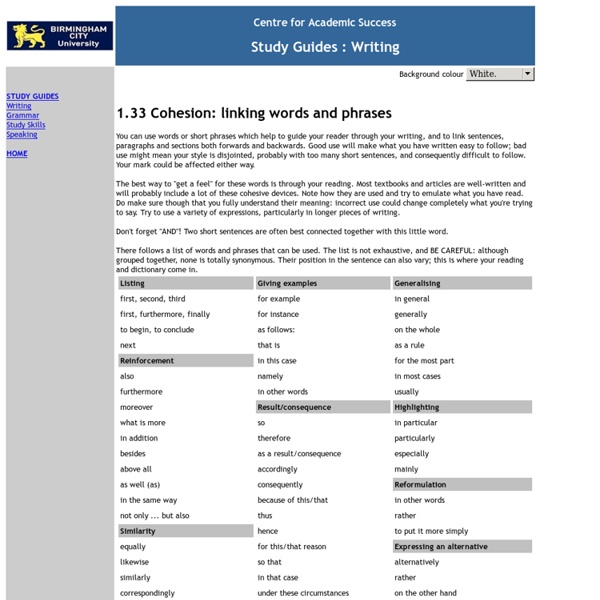Linking Words — A complete List of English Connecting Words
Linking & Connecting Words It is essential to understand how Linking Words, as a part of speech, can be used to combine ideas in writing - and thus ensure that ideas within sentences and paragraphs are elegantly connected - for the benefit of the reader. This will help to improve your writing (e.g. essay, comment, summary (scientific) review, (research) paper, letter, abstract, report, thesis, etc.). It is also fundamental to be aware of the sometimes subtle meaning of these "small" words within the English language.
Oxford University Press
Academic readiness Q: Skills for Success Second Edition helps students to get ready for academic success. Enhanced skills support provides four extra pages of reading or listening comprehension in every unit, deepening students’ understanding of the unit topic and better preparing them for the unit assignment. A greater variety of activities encourages students to use critical thinking skills, such as making inferences or synthesizing information from different texts. Video in every unit adds a new dimension to the course, and provides an additional springboard for students to think critically. The documentary-style videos use material from the BBC and CBS, providing authentic, high-interest input related to the unit topic.
Dividing your work into paragraphs
Good paragraphs divide up your assignment according to topics or major points. Each paragraph should discuss just one main idea and your reader should be able to identify what the paragraph is about. Each new paragraph should indicate a change of focus.Paragraphs often start with a topic sentence or part of a sentence – a statement which is expanded on in the rest of the paragraph. (Try reading only the first sentence of each paragraph of a newspaper article.
Character and Personality Adjectives - Tasks
Here you can find the list of adjectives that describe character and personality Look at the following words which are used to describe a person’s character. Make two columns of positive and negative ones of them: cock-sure honest aggressive two-faced sensitive
Transition Words & Phrases
As a "part of speech" transition words are used to link words, phrases or sentences. They help the reader to progress from one idea (expressed by the author) to the next idea. Thus, they help to build up coherent relationships within the text.
Online Proofreader: Pre-grade your paper
Paste the text of your paper below (or upload a file) and select the "Get Report" button to immediately receive your analysis.* Upload File Select the education level of this paper's author*: Select the type of paper you are submitting (optional):
6th Grade Social Studies : Writing Comparison-Contrast Paragraphs
Today's Writing Objective Write informative/explanatory texts to examine a topic and convey information through the use of comparison/contrastWarm-Up: Selecting Your Similarities and Differences As you know, today we will begin writing compare-contrast paragraphs in which we explain the similarities and differences between Hatshepsut and Ramses II. Before we do, however, we must decide which similarities and differences we find most important and want to feature in our paragraphs. Your task: Review the Hatshepsut and Ramses II Venn Diagram from yesterday.
Chicago/Turabian Documentation Style
The Chicago or Turabian style, sometimes called documentary note or humanities style, places bibliographic citations at the bottom of a page or at the end of a paper. You can find specific formatting, footnoting, and bibliographic information through the menu to the right, or download this information as a Although the 16th edition of The Chicago Manual of Style (2010), which is available online, and the 8th edition of Kate L.
Dave's ESL Cafe: Free English Grammar Lessons
Adjective Clauses #1 Adjective Clauses #2 Adjective Clauses #3 Adjective Clauses #4 Adjective Clauses #5 Adjective Clauses #6 Adjective Clauses #7 Adjective Clauses #8 Adjective Clauses #9 Adjective Clauses #10 Adjective Clauses #11 Adjective Clauses #12 Adjective Clauses #13 Conditional Sentences #1 Conditional Sentences #2 Conditional Sentences #3 Conditional Sentences #4 Conditional Sentences #5 Conditional Sentences #6 Conditional Sentences #7 Conditional Sentences #8 Conditional Sentences #9 Confusing Words: Bring and Take Confusing Words: Come and Go Confusing Words: Get #1 Confusing Words: Get #2 Confusing Words: Get #3 Confusing Words: Get #4 Confusing Words: Get #5 Confusing Words: Get #6 Confusing Words: Get #7 Confusing Words: Get #8 Confusing Words: Get #9 Confusing Words: Get #10 Confusing Words: Get #11 Confusing Words: Get #12 Confusing Words: Get #13 Confusing Words: Hang Confusing Words: It's and Its Confusing Words: Lend and Borrow
Academic Writing:Introduction
Just as there are differences in the way we use language for speech and for writing, there are also differences in the way we write for different situations; for example, compare the following written texts: Dear Mark, My accountant friend thinks that phone company shares are a good buy at the moment so I think I'll move some money into them... Some financial advisors recommend purchasing communication industry shares. Obviously, the second way of phrasing the idea is much more appropriate for your university assignment. This unit on Academic Writing will focus on the aspects of language that are significant for writing at university.



